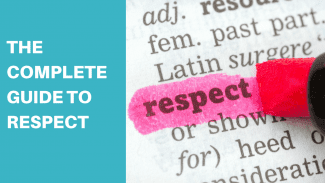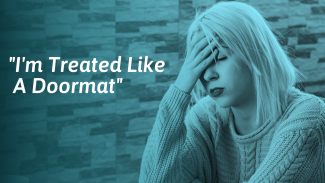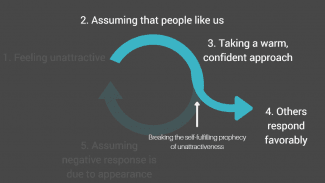“It’s difficult for me to be myself around other people, and I usually feel like I’m faking or forcing it. I try really hard to fit in, but it doesn’t feel like it’s working. Is the problem that I’m not trying hard enough, or is it that I’m trying too hard?”
We are taught that hard work and effort will get us what we want in life, but there are some situations where this approach just doesn’t work. According to research, trying too hard to make a good impression on people can actually make you less likable, suggesting that hard work isn’t always the way to make friends.[1]
Instead of trying so hard, you may have more success by being yourself and acting more normal around other people. This article will provide research-backed tips on how to make a good impression without trying too hard or being untrue to yourself.
Making a good impression: what works and what doesn’t
Making a good impression and being likable is important in all areas of your life, including your personal life, at work, and when trying to meet people and make friends. The key is to find a balance between not trying hard enough and trying too hard, as going too far in either direction can backfire.
It’s also important to focus your efforts on the strategies that actually work. Some of the ways you might try to avoid rejection or get people to like you can make you more anxious, less authentic, and ultimately, less likable.[1, 2] Extensive research has been conducted on effective and ineffective ways to make a good impression and get people to like you, which is summarized below:[1, 2, 3, 4, 5]
| Effective ways to make a good impression | Ineffective ways to make a good impression |
| Showing interest: asking questions, showing concern and interest in other people | Holding back: playing it safe, staying quiet, not opening up, not sharing ideas or opinions |
| Being honest: opening up, being vulnerable, sharing real thoughts and feelings, being direct | Playing it cool: pretending to be indifferent, not care, hiding your true goals, feelings, and needs |
| Positivity: leading enjoyable conversations, quality time, humor, and optimism | Self-criticism: exaggerating flaws to make people feel good or to get validation |
| Listening: slowing down, letting people speak, asking questions, showing interest | Taking over: interrupting, filling every silence, not letting other people speak |
| Vulnerability: disclosing things that are somewhat personal or sensitive to build trust | Perfectionism: trying too hard to hide mistakes, flaws, and weaknesses from others |
| Kindness: being thoughtful, sensitive to the feelings and needs of others, helping people | Aggression: power trips, dominating conversations, intimidation |
| Confidence: being assertive, setting clear boundaries, being upfront and honest | Bragging: trying too hard to impress people with looks, status, money, or achievements |
| Inclusion: including people in conversations, being open-minded and supportive | Being needy: seeking pity, approval, or validation, oversharing, nagging or annoying |
| Authenticity: being real with people about your interests, thoughts, feelings, and needs | Ingratiation: overusing flattery, faking enthusiasm, too polite, or a people pleaser |
Sections
How to stop trying too hard
If you feel like you’ve been trying too hard to seem cool, funny, or likable, and it isn’t working, you are probably using some of the strategies that don’t work and not enough of the ones that do. By redirecting your efforts to the habits and tendencies that are proven to make people more likable, you will have more success.
Many of these strategies involve relaxing, opening up, and being more of your true self instead of trying to mimic other people or become what you think they want you to be.
Here are 10 ways to interact with people in a more natural and authentic way while also making a good impression:
1. Relax your body
When you are feeling nervous or awkward, you might notice that your muscles tense up, and your posture becomes rigid. Intentionally taking a deep breath, exhaling slowly, and letting your shoulders drop can help you relax and let go of tension.
Find a posture that feels comfortable and relaxed for you, and avoid letting your body become too stiff. Your brain takes cues from your body and behavior, so taking deep breaths and releasing tension in your muscles can help you feel calmer and more confident, making it easier to interact in a natural way with other people.[6]
2. Use your natural voice
When you’re nervous, you might talk faster or louder than you normally do, or you might notice you speak higher or with more emphasis than normal.[7] A lot of people unconsciously mimic other people when they feel nervous, picking up their mannerisms or copying the way they speak.
When you speak with people who you feel most comfortable with, notice how loud and how fast you normally talk, how much emphasis you use, and what kind of language and phrases you use. This is your natural voice, and if you can use it with everyone, you will find it easier to interact in a way that feels normal and natural.
3. Slow down and allow silence
Silence can feel uncomfortable when you are nervous, but filling every silence can rush the conversation and create a pace that feels hard to keep up with. By slowing down and waiting for the right moment to speak, you can reduce your anxiety and interact more naturally.[6, 7]
Allowing silences and pauses also helps to make sure that you aren’t the one doing all of the talking, which helps to keep conversations from feeling forced, rushed, or one-sided. Encouraging other people to engage, open up, and talk more will take pressure off you, while also helping you show interest in others, helping to make a good impression.[3, 4]
4. Change your mindset
Negative and self-critical thoughts are like food for anxiety, making it bigger and stronger.[7, 8] When you can interrupt or change these negative thoughts, your anxiety will often go away on its own, making it much easier to talk to people in ways that feel natural. Cognitive behavioral therapy, or CBT, is the most effective form of therapy for anxiety and works by changing anxious thoughts.[7]
We recommend BetterHelp for online therapy, since they offer unlimited messaging and a weekly session, and are cheaper than going to a therapist's office.
Their plans start at $64 per week. If you use this link, you get 20% off your first month at BetterHelp + a $50 coupon valid for any SocialSelf course: Click here to learn more about BetterHelp.
(To receive your $50 SocialSelf coupon, sign up with our link. Then, email BetterHelp’s order confirmation to us to receive your personal code. You can use this code for any of our courses.)
You can practice CBT by turning your “what if…” thoughts into “even if…” thoughts, which will help take power away from your fears. Another way to think more positively is by imagining that people like you, are interested in what you have to say, and have a lot in common with you. Changing your perspective can help you feel more positive about your interactions.[2, 7, 8]
5. Focus on other people
When you are anxious or insecure, you are often too focused on yourself and distracted by your own thoughts, which can make it impossible to be fully engaged in a conversation. When you focus your attention on other people, you can interrupt self-conscious thoughts and feel more present and engaged in your conversations.[7, 8]
Practice this skill by becoming a better listener and giving other people your full, undivided attention when they talk. Asking questions, showing interest, and making eye contact with them demonstrates that you are listening and is also a proven way to get people to like you.[3, 4]
6. Be more human
While it might seem like being perfect and hiding all of your mistakes and flaws will win you friends, it can actually intimidate people and make them insecure. Because no one is perfect, letting some of your own flaws and quirks show can actually make you more approachable, and makes others more comfortable opening up to you.[5]
Being more human doesn’t mean you have to exaggerate your weaknesses and flaws; it just means not trying too hard to hide them and being a little more open and honest. When you make a mistake, own it, and when you don’t know something, admit it. Being more human other people get to know you better and create an opportunity for a deeper connection with them, and it’s also good for your self-esteem.[5, 9]
7. Make your goals clear
Many people play games in a relationship, trying to play it cool or not being clear about what they want from the other person. For example, some people settle for casual hook-ups because they are scared to be upfront about the fact that they really want something more serious.
When you play games like these, you send mixed signals to people that can make people confused about what kind of relationship you want with them. If you want to be friends with someone, try to send clear signals to them by starting conversations, showing interest, and asking them to hang out instead of pretending to be indifferent.
8. Set healthy boundaries
In an effort to be liked, you might have let people take advantage of you, treat you poorly, or let people treat you like a doormat. This sometimes helps you avoid conflict in the moment, but it also can damage your self-esteem and create imbalances in your relationships.
You don’t have to be confrontational to set boundaries with people, just be honest about what you like and don’t like, and let them know if they said something that bothered you or hurt your feelings. Setting healthy boundaries shows confidence and self-respect. They can help you build healthy relationships where you are treated the way you want to be treated.[8]
9. Celebrate what makes you unique
While you might feel insecure about things that make you different from other people, these are things that make you unique. If you have certain quirks, an odd sense of humor, or an unusual interest, try to see these as part of what makes you unique and special, instead of as things that make you “less than.” After all, a world full of identical people would be pretty boring.
When you celebrate the things that make you unique, you don’t have to try to hide your differences from other people. This will help you be more authentic, improve your self-esteem, and help you connect with others in ways that feel more meaningful.[2, 5, 8]
10. Make other people feel good
After an interaction, people often don’t remember everything that you said, but they almost always remember how you made them feel. Pay attention to other people when you interact with them, and watch to see how they respond to you.
If they lean in, make eye contact, and seem enthusiastic, it is usually a sign that the conversation is going well. If they seem uncomfortable, look away, or get quiet, it might be a sign that you’ve offended them or brought up a sensitive topic. By getting better at reading social cues, you can have more positive interactions that people enjoy, making it more likely they will want to interact with you in the future.[1, 3, 4]
Common questions
Am I trying too hard?
Spending a lot of time overthinking your interactions, rehearsing them ahead of time, and feeling exhausted afterward are signs you may be trying too hard. Trying too hard can manifest as trying to be more like others, less like yourself, or using a persona that you think will impress other people.
Why do I try so hard?
You try so hard to be liked, funny, or cool in order to get people to like and accept you. This is a good thing because it means you value relationships. The problem comes when you need people to like you in order to feel OK about yourself and base your self-worth on the approval of other people.
How can I feel OK when people don’t like me?
True self-worth comes from the inside and doesn’t depend on the opinions of others. Accepting your imperfections, practicing self-compassion, setting boundaries, and being true to yourself are all good ways to build self-esteem and become less dependent on the approval of other people.[3, 5]
Final thoughts
By relaxing, opening up, and being more of yourself, you can have interactions that feel more natural, and you make it possible for people to see and accept you for who you are. Being more authentic can also help you improve your anxiety, feel more confident, and boost your self-esteem.[2, 7, 8, 9]
While it’s important to put effort into your relationships, you want to put your efforts into actions and habits that are most likely to pay off. These include showing interest in others and being more thoughtful, kind, and attentive.








This article makes me feel so bad for the future of the world. I never thought someone would need to write an article trying to teach people how not to try their hardest. Instead of the person doing their best and continuously improving at something by looking up how not to do that I would advise those who are getting upset that they are losing and someone else is succeeding to lookup how to improve or how to lose graciously. The world could use a lot more try-hards in all aspects of life instead of using it as an insult.